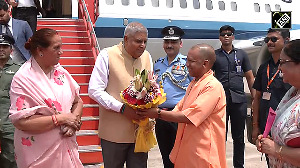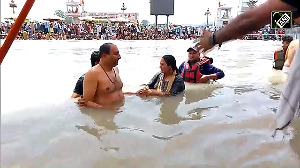'The arrests of Sanatan Sanstha members for committing murder and stockpiling explosives with the alleged intent of committing mass murder must be embarrassing to a majoritarian government,' notes Devangshu Datta.
Illustration: Uttam Ghosh/Rediff.com

The great Jadugar K Lal once told me that stage magic just involved using imagination, followed by careful scripting and practice.
He said the really difficult thing was learning the art of distraction.
Misdirecting the audience's attention was, he said, a skill that far transcended the performance of smooth sleights of hand and the crafting of clever mechanical illusions.
It is a skill that the current political establishment has learnt well.
Whenever it's under pressure, it creates some sort of distraction to drag attention away from the embarrassment of the moment.
The dawn raids by the Pune police on activists across the country was undoubtedly an attempt to do just that.
It succeeded since the arrests have dominated the news cycle for the next two days.
The question is, what was so embarrassing that the Centre decided to risk public opprobrium and ridicule by arresting elderly academics and lawyers on absurd charges?
It's hard to find answers.
Could it have been demonetisation?
A Parliamentary committee had just criticised the exercise in no uncertain terms, pointing out the many undesirable outcomes.
The Reserve Bank of India's annual report has also underlined the futility of the foolish exercise, which, if you remember, led to the deaths of over 100 people and caused misery to hundreds of millions.
Practically all the cash came back.
Cash held by the public now is back above pre-demonetisation levels.
The structure of household savings has changed for the worse, with the aam janta pulling money out of banks.
Bureaucrats told to defend the move have been reduced to risible statements like 'Demonetisation worked, don't ask how.'
Or, perhaps, it's the meanness displayed in disbursing relief funds to Kerala? The southern state will require many, many thousands of millions to bootstrap out of this calamity.
The Centre is being niggardly in releasing tiny amounts in dribs and drabs.
Enough 'friends of the establishment' have pushed out faked images of the Rashtriya Swayamsevak Sangh delivering aid to lead the cynical among us to wonder why no real images could be produced.
And the less said about refusing aid from abroad the better.
The excuse is that this is government policy.
Well, surely this brave decisive government could change the policy?
However, it might not be Kerala or demonetisation that required fuzzing out of primetime focus.
The arrests of Sanatan Sanstha members for committing murder and stockpiling explosives with the alleged intent of committing mass murder must be embarrassing to a majoritarian government.
Maybe the civil rights activists were arrested in order to ensure that mass media did not focus on those arrests?
Or is it actually the Rafale controversy that the government doesn't want debated on primetime?
There are so many weird elements to that story that it would be hard to peddle it as fiction. One government negotiates for 126 planes.
The next government decides to pay much larger sums for 36 planes.
What's more, an industrialist who has never fabricated a plane in his career and whose companies owe over Rs 450 billion, suddenly becomes a joint venture partner of Dassault Aviation.
The French say they have no objection to the costs being mentioned in Parliament.
The Indian government says it can't mention the numbers because it has a secrecy clause in a treaty with France!
Maybe it's not the Rafale controversy either.
It could just be the record prices of diesel and petrol and the record weakness of the rupee.
After all, the current prime minister spent a lot of time excoriating the last government for the weak rupee and the high price of fuels.
Or, it could be the release of the Sudipto Mundle-led committee report on real sector statistics that suggested the last government did a better job in terms of generating growth.
Or, it might be Doklam, where the People's Liberation Army has apparently been settling down.
Or, it may be the failure of helicopter diplomacy in the Maldives.
That's a lot of potentially embarrassing stuff that could have made it to the news cycle.
Instead, we had the spectacle of 70-year-old academics being interrogated on why they read books on Marx and Mao.
Well played!












